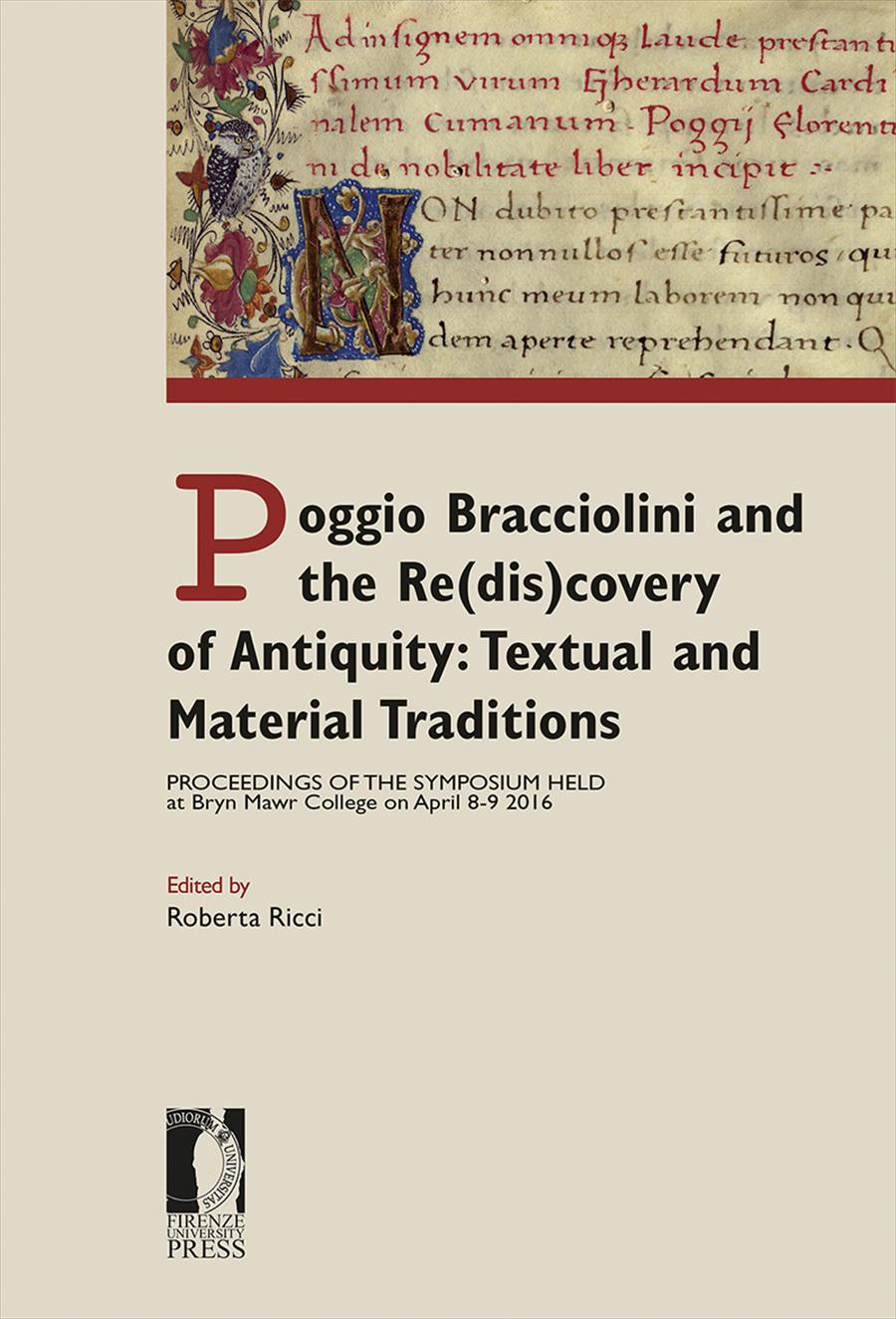- Poggio Bracciolini and the Re(dis)covery of Antiquity: Textual and Material Traditions
- Edited by Roberta Ricci
Poge the Florentyn: A Sketch of the Life of Poggio Bracciolini
- David Cast
- © 2020 Author(s) |
- CC BY 4.0
- DOI: 10.36253/978-88-6453-968-3.12
Thanks to his part in the rediscovery of Lucretius in the Renaissance Poggio Bracciolini has been much in academic news recently. But he was always there as a part of the histories of that moment, in all its twists and turns, as an example of what it was to be a Renaissance humanist in the earlier part of the XVth century. He was born in 1380 and educated first in Arezzo. But he soon moved to Florence to become a notary and from his intellectual contacts there a little after 1403 he became a member of the entourage of Pope Benedict IX to remain all his life a member of the Papal court. But, in true humanist fashion, he was busy always with his writings, taking on a range of general subjects, nobility, the vicissitudes of Fortune and many others. Also, again in true humanist fashion, he was often involved in dispute with other scholars, most notably Lorenzo Valla. Yet, amidst all this activity, he had time to travel throughout Europe, scouring libraries to uncover, as with Lucretius, long neglected texts. But perhaps his most notable achievement was the design of a new script, moving away from the less legible texts of medieval copyists to provide one, far easier to read, that was to become the model in Italy for the first printed books – as it is a model still for publishers. Few scholars of that moment can claim to have had so profound and persistent an influence on the spread of culture in Europe and beyond.
- Keywords:
- Lucretius,
- Humanism,
- Renaissance translations,
- rediscovery of manuscripts,
- Manutius,
Bryn Mawr College, United States
- Ariani M., Gabriele M. 1998, Francesco Colonna: Hypnerotomachia Poliphili, Adelphi, Milano.
- Bacci D. 1963, Cenni biografici e religiosità di Poggio Bracciolini, Enrico Ariani e L’arte della Stampa. Firenze.
- Bigi E., Petrucci A. 1971, Dizionario biografico degli italiani, Istituto della Enciclopedia Italiana, Roma.
- Davies M. 1999, Aldus Manutius: printer and publisher of Renaissance Venice, Arizona Center for Medieval and Renaissance Studies, Tempe.
- Deufert M. 2017, Prolegomena zur edition Teubneriana des Lucrez, Walter de Gruyter, Berlin.
- de la Mare A. 1963, The Handwriting of Italian Humanists, Oxford University Press, Oxford.
- Fergusson W. 1948, The Renaissance in Historical Thought, Houghton Mifflin, New York.
- Flores E. 1980, Le scoperte di Poggio e il testo di Lucrezio, Liguori, Napoli.
- Fox M. 2016, Rev. Robert Palladino, Scribe Who Shaped Apple’s Fonts, Dies at 83, «The New York Times», 6 March, <https://www.nytimes.com/2016/03/06/arts/design/rev-robert-palladino-83-scribe-who-shaped-apples-fonts.html> (09/2019).
- Galleria degli Uffizi 1979, Gli Uffizi: catalogo generale, Centro di Firenze.
- Greenblatt S. 2011, The Swerve: How the World Became Modern, W.W. Norton, London.
- Janson H. 1963, The Sculpture of Donatello, Princeton University Press, Princeton.
- Kallendorf C. s.d., Poggio Bracciolini. Oxford Bibliographies Online: Renaissance and Reformation, <http://www.oxfordbibliographies.com/view/document/obo-9780195399301/obo-9780195399301-0095.xml> (09/2019).
- Mercey F. de 1840, Le théâtre en Italie, «Revue des Deux Mondes», 31, p. 823.
- Muratori L. 1731, Rerum italicarum scriptores, vol. 30, L. Stampato, Roma.
- Morrison S. 1972, Politics and Script: Aspects of authority and freedom in the development of Graeco-Latin Script from the sixth century B.C. to the twentieth century A.D., Oxford University Press, Oxford.
- Palmer A. 2014, Reading Lucretius in the Renaissance, Harvard University Press, Cambridge.
- Pastor L. von 1891, The History of the Popes, trans. by R.F. Kerr, J. Hodges, London.
- Pittaluga S. 2005, Le Pogge: Facéties / Confabulations, Les Belles Lettres, Paris.
- Rorimer J. 1955-1956, A reliquary bust made for Poggio Bracciolini, «Metropolitan Museum of Art Bulletin», n.s. 14, pp. 246-51.
- Rundle D. 2012, Un amico del Roscoe: William Shepherd and the first modern Life of Poggio Bracciolini (1802), in S. Fletcher (ed.), Roscoe and Italy: the reception of Italian Renaissance History and Culture in the Eighteenth and Nineteenth Centuries, Farnham, Ashgate, pp. 177-193.
- Sabbadini R. 1905, Le scoperte dei codici latini e greci ne’ secoli XIV e XV, Sansoni, Firenze [reprinted in 1967].
- Shepherd R. 1802, The Life of Poggio Bracciolini, Cadell & Davies, London [reprinted in 1837, Harris Brothers, Liverpool], <http://www.Elfonspell.com/PoggioLifeCh1.html> (09/2019).
- Sozzi L. 1982, Le Facezie e loro fortuna europea, in Poggio Bracciolini: 1380-1980, Sansoni, Firenze, pp. 235-260.
- Ullman B.L. 1960, The Origin and Development of Humanistic Script, Edizioni di Storia e Letteratura, Roma.
- Voigt G. 1859, Die Wiederbelebung des classischen Altertums, oder das erste Jahrhundert des Humanismus, Georg Reimer, Berlin.
- Walser E. 1914, Poggius Florentinus: Leben und Werke, Teubner, Leipzig [reprinted in 1974, Georg Holms Verlag, Hildesheim]
- Wardrop J. 1963, The Script of Humanism: Some aspects of the humanist script 1460-1560, Oxford University Press, Oxford.
- Womersley D. (ed.) 1994, The History of the Decline and Fall of the Roman Empire, 3 vols., by E. Gibbon, The Penguin Press, London.
- Wright A. 2005, The Pollaiuolo Brothers: The Arts of Florence and Rome, Yale University Press, New Haven.
Chapter Information
Chapter Title
Poge the Florentyn: A Sketch of the Life of Poggio Bracciolini
Authors
David Cast
Language
English
DOI
10.36253/978-88-6453-968-3.12
Peer Reviewed
Publication Year
2020
Copyright Information
© 2020 Author(s)
Content License
Metadata License
Bibliographic Information
Book Title
Poggio Bracciolini and the Re(dis)covery of Antiquity: Textual and Material Traditions
Book Subtitle
Proceedings of the Symposium Held at Bryn Mawr College on April 8-9, 2016
Editors
Roberta Ricci
Peer Reviewed
Number of Pages
220
Publication Year
2020
Copyright Information
© 2020 Author(s)
Content License
Metadata License
Publisher Name
Firenze University Press
DOI
10.36253/978-88-6453-968-3
ISBN Print
978-88-6453-967-6
eISBN (pdf)
978-88-6453-968-3
Series Title
Atti
Series ISSN
2239-3307
Series E-ISSN
2704-6230
